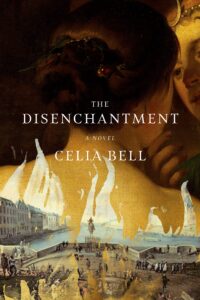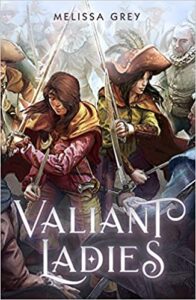Amazon Affiliate Link | Bookshop.org Affiliate Link
Celia Bell’s debut novel, The Disenchantment (Pantheon 2023), is a stunning example of queer historical fiction at its finest.
Set in seventeenth-century Paris, The Disenchantment follows Baroness Marie Catherine, who lives in a world of luxury, entertainment, and intrigue. However, there is also an undercurrent of darkness racing through Parisian nobility: rumours of witchcraft, deliberate poisoning, and fraud abound, and the voracity of the rumour mill means no one is completely safe. Marie Catherine hides her own secrets. Her tyrannical and distant husband is an oppressive and regulatory force, and when he is home she does all she can to protect her children from him by telling them fairy stories. However, when he is away, Marie Catherine is free to engage with her intellectual pursuits, including salons and spirited conversations with female scholars and writers.
Furthermore, at the heart of Marie Catherine’s liberated existence beyond her husband is Victoire Rose de Bourbon, Mademoiselle de Conti. Androgynous, bold, and seemingly fearless, Victoire and Marie Catherine are lovers, and Victoire quickly proves to be a source of joy in Marie Catherine’s life. She admires Victoire’s confidence and freedom, and as the situation becomes more and more volatile in her home, Marie Catherine knows she must escape. When a violent murder occurs involving those close to Marie Catherine, she is faced with a choice, and the one she makes leads her down a path she could never have predicted, and toward people who are committed to protecting their own interests.
I loved this novel. It’s difficult to talk about this book without giving too much away, but the twists and turns of this plot are completely gripping. Bell’s writing is immersive, and captures the atmosphere and drama of this plot so thoroughly that I was hardly able to put it down. Lesbian historical fiction is undeniably my favourite literary genre and this book did not disappoint. The Disenchantment is well-researched, comprehensive, and draws on little-known moments of French history, expertly weaving fiction and fact together to create a wholly original novel. This book is perfect for fans of Maggie O’Farrell’s The Marriage Portrait (2022) or Emma Donoghue’s The Sealed Letter (2008).
Marie Catherine and Victoire were characters I loved and believed in, and Bell captures their unique and sometimes warring motivations. However, Bell doesn’t only pay attention to upper-class perspectives in this novel, and the text is a much wider examination of Parisian society in this period. This novel felt like a mix of genres in the best way—part literary fiction, historical fiction, crime fiction, mystery, and Gothic. It kept me guessing until the very end and felt like a thoroughly original, gorgeous historical portrait.
I highly recommend The Disenchantment for fans of queer historical fiction and/or literary fiction. This is undeniably one of my top queer reads of the year.
Please add The Disenchantment to your TBR on Goodreads and follow Celia Bell on Twitter.
Rachel Friars is a writer and academic living in Canada, dividing her time between Ontario and New Brunswick. When she’s not writing short fiction, she’s reading every lesbian novel she can find. Rachel holds two degrees in English literature and is currently pursuing a PhD in nineteenth-century lesbian literature and history.
You can find Rachel on Twitter @RachelMFriars or on Goodreads @Rachel Friars.


